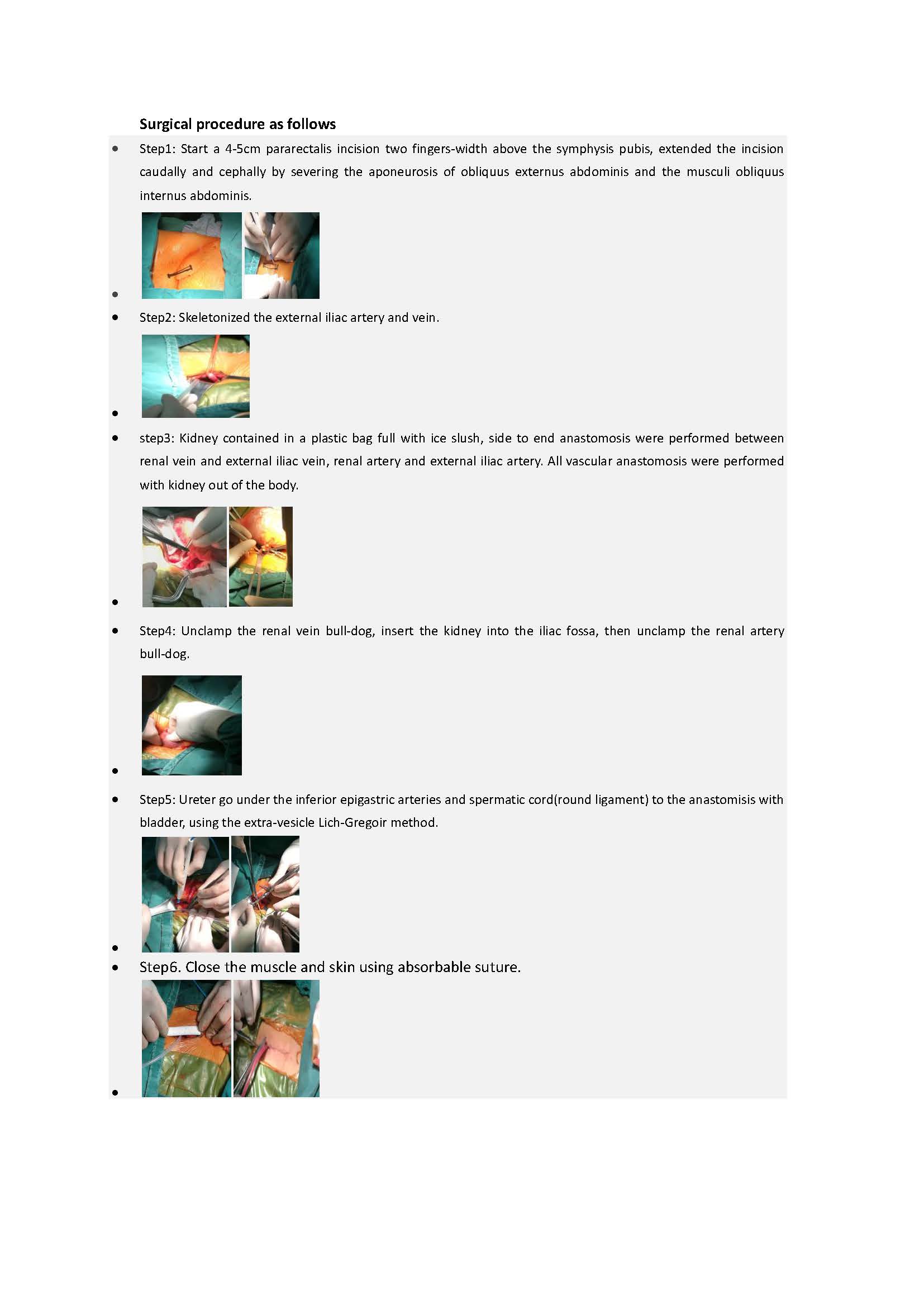Comparison of Minimal Incision Kidney Transplantation with Conventional Incision Kidney Transplantation: Interim Report of a Randomized Controlled Trial
Organ Transplantation Center, Urology Department, Urology Research Institute, WestChina Hospital, Sichuan University, Chengdu, China
Meeting: 2019 American Transplant Congress
Abstract number: 289
Keywords: Kidney transplantation, Surgical complications
Session Information
Session Name: Concurrent Session: Surgical Issues: All Organs
Session Type: Concurrent Session
Date: Monday, June 3, 2019
Session Time: 2:30pm-4:00pm
 Presentation Time: 2:42pm-2:54pm
Presentation Time: 2:42pm-2:54pm
Location: Room 208
*Purpose: Minimally invasive surgery is rarely applied in kidney transplantation. Few studies have mentioned small incision kidney transplantation, while the incision length is still about 10cm. Here, we developed a novel Minimal Incision Kidney Transplantation(MIKT), with much shorter incision length, and compare its efficacy and safety with the conventional kidney transplant (CKT)surgery.
*Methods: We ran a open label, randomized controlled trial (ChiCTR2018000147345) with estimated 160 patients included (Conventional group:80, SMIKT:80). Inclusion criteria were Body mass index (BMI)<25kg/m2, no lower abdomen surgery history, left kidney or right kidney with elongated renal vein. There was no routine postoperative narcotic pain free regimen, when necessary, analgesic were administrated. Operation time, surgical complications, post-operative pain, analgesic requirements, renal function, incision satisfaction and Vancouver scar scale were compared. Presently, we give a interim report of 80 patients with follow up more than 3 months.
*Results: 40 patients underwent CKT and 40 received MIKT. There was no difference in donor age, donor gender, eGFR, recipient age, recipient gender, dialysis period, HLA mismatch, induction therapy, kidney length and kidney weight. The BMI for CKT and MIKT was 20±2.2 and 20.2±2.7. MIKT group had longer renal vein (4.1±0.9 vs. 3.6±0.6, p=0.004). respectively. Comparing to CKT, MIKT had similar artery, vein and ureter anastomosis time and similar operation time (94.8±24.4 vs. 94.3±27.7min, p=0.929), but much shorter incision length(5.8±1.2 vs. 12.5±1.1cm,p<0.001). Both groups had comparable blood loss. In MIKT group, one patient had post-operative massive bleeding requiring re-operation and one had ureter stenosis with double- J ureteral stent placed at 3 month. Both group had no delayed graft function and comparable occurrence of acute rejection (2/40 vs. 1/40, p=0.556), delayed wound healing (2/40 vs. 1/40, p=0.556) and renal function. No difference were detected in postoperative pain score, patients requiring analgesic, dose of analgesic, and time to first flatus between two groups. Of note, patients underwent SMIKT reported significantly higher incision satisfaction score and lower Vancovour scar score at 1, 2, and 3 month after transplantation.
*Conclusions: MIKT is a safe surgery procedure, which did not increase the operative time, while significantly reduced incision length with better short term cosmetic effect and patient satisfaction.
To cite this abstract in AMA style:
Lin T, Song T, Jiang Y, Fan Y, Wang X, Huang Z, Liu J, Wang Z. Comparison of Minimal Incision Kidney Transplantation with Conventional Incision Kidney Transplantation: Interim Report of a Randomized Controlled Trial [abstract]. Am J Transplant. 2019; 19 (suppl 3). https://atcmeetingabstracts.com/abstract/comparison-of-minimal-incision-kidney-transplantation-with-conventional-incision-kidney-transplantation-interim-report-of-a-randomized-controlled-trial/. Accessed February 23, 2026.« Back to 2019 American Transplant Congress

